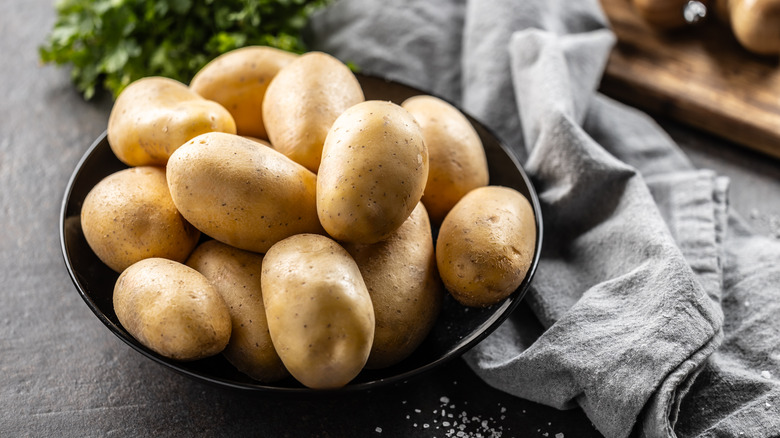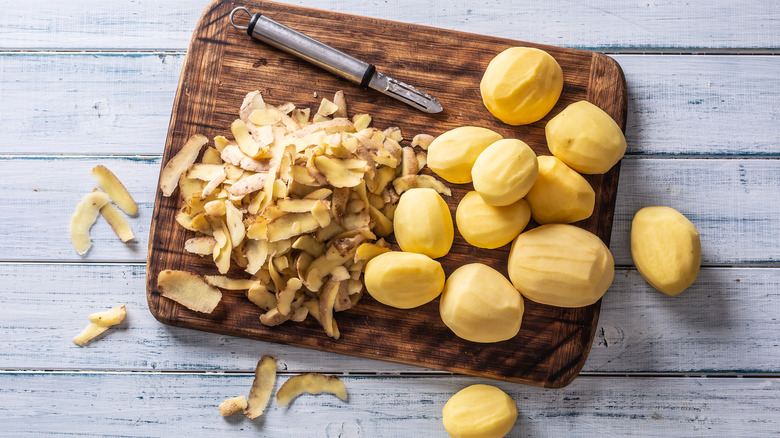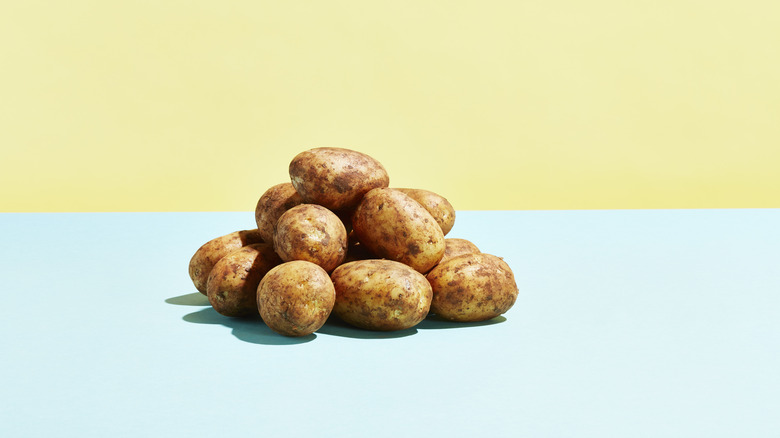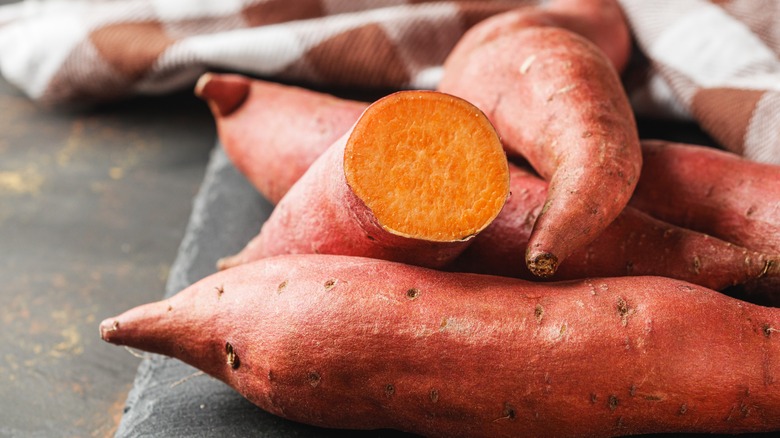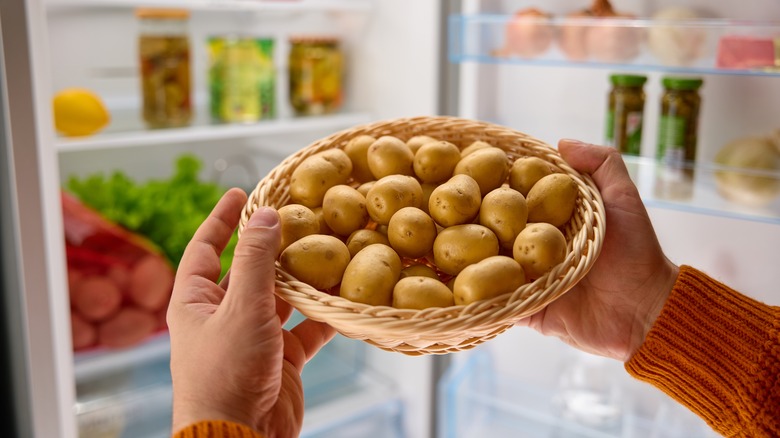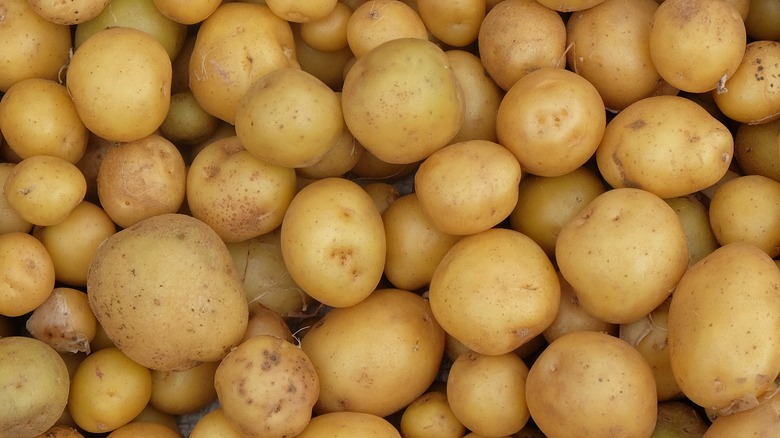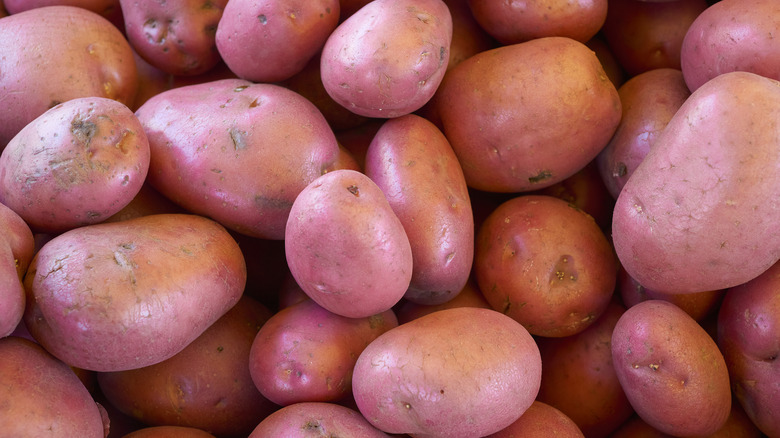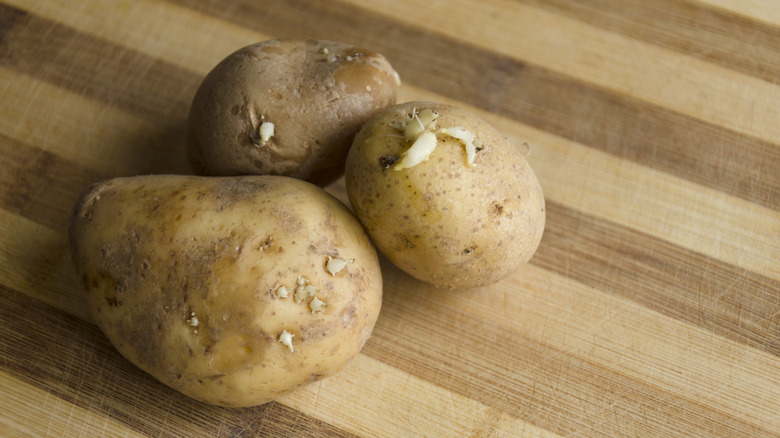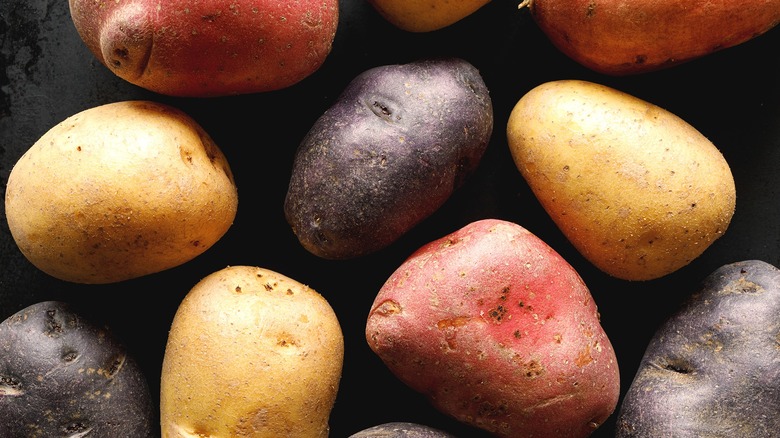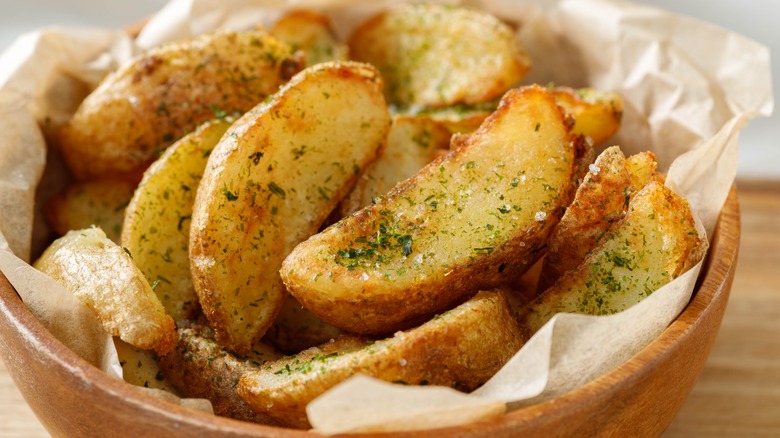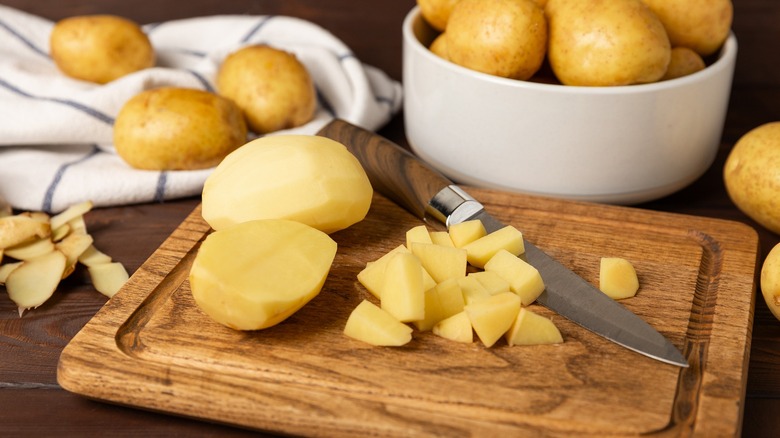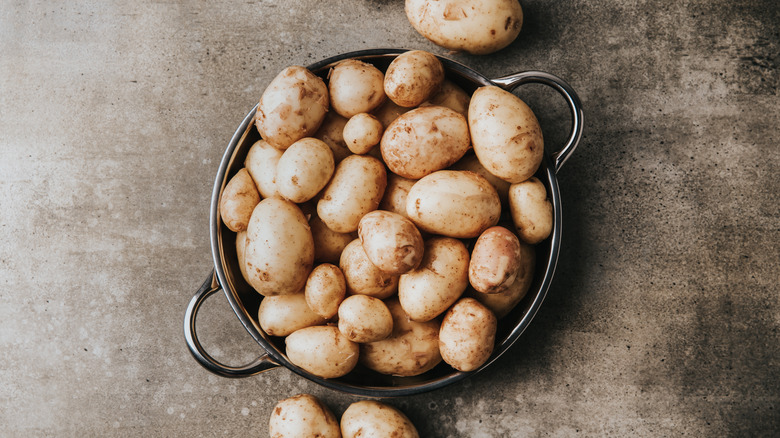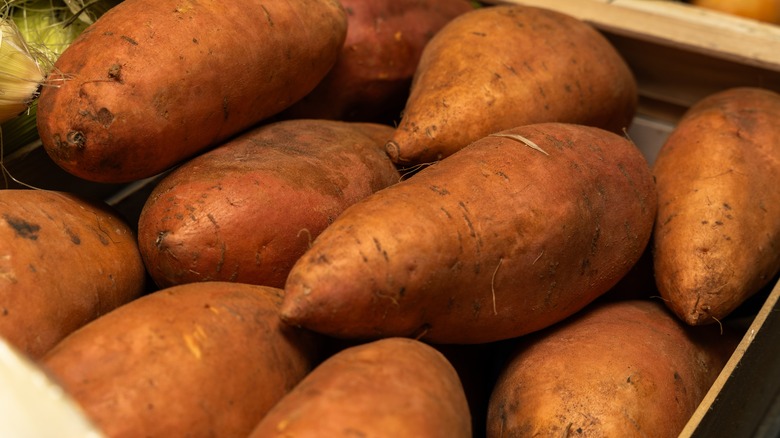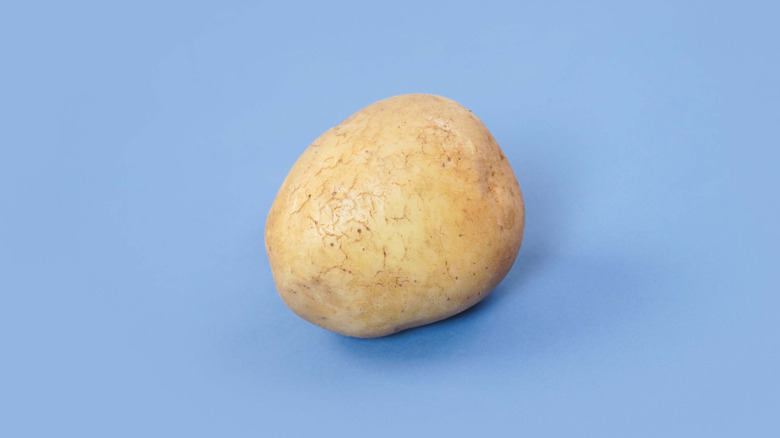14 Of The Biggest Potato Myths, Debunked
For such a simple vegetable, potatoes have a lot of mystery surrounding them. This staple ingredient has been a backbone of many cuisines around the world for thousands of years. In that time, many different potato varieties (and even more potato recipes) have sprung up. There are now many myths surrounding potatoes, especially regarding their nutrition. Over the years, potatoes have developed an astonishingly bad reputation, with people assuming that they're unhealthy, lacking in nutrients, or that eating them could cause some health conditions to worsen. Other persistent potato myths involve the safety of different preparation methods.
However, not all myths surrounding the humble potato are bad. Others are more innocuous, with folks out there often mistaking certain types of potatoes for others, or else assuming that different types of potatoes come from the same family (spoiler alert: They don't). There are even some wild and wacky mistruths out there about the potato's ability to cure certain ailments, which are — if you'll excuse the pun — rooted in folklore. We dug up our favorite myths about potatoes to put an end to all the gossip, so you can eat your fries in peace.
1. Myth: If you peel a potato, you'll remove all its nutrients
One part of the potato is seriously misunderstood — and it's not the part you might expect. Potato flesh is widely considered to be somehow lacking in nutrition, and there's a pervasive myth that if you get rid of the rough, chewy skin from the outside of your potato, then all you'll be left with is a mass of starch. This couldn't be further from the truth. Most of the nutrients in a potato are in the flesh itself, with two of the most important nutrients in the vegetable, potassium and vitamin C, occurring there in high quantities. If you peel a potato, you'll get rid of a small amount of vitamin C and potassium, but the majority of it will be left untouched.
But one nutrient that does occur mostly in the skin is fiber. Approximately half of the average potato's fiber is in its skin, and peeling it can remove an important source from your diet. The good news, though, is that even if you don't want to eat your potatoes skin-on, you can still put that skin to good use. Fry or bake your potato skins after removing them to make a delicious snack that's full of fiber and won't make you feel like you're wasting food.
2. Myth: The carbs in potatoes are unhealthy
The potato often gets lumped in with white rice, white bread, and pasta as a carbohydrate that is considered unequivocally bad for you. While it's certainly true that eating copious amounts of potatoes at the expense of all other foods won't do you many favors, it's a mistake to assume that the carbs in potatoes will make your diet unhealthy. Registered dietitian Cara Harbstreet points out, via PRNewswire, that carbs are an essential part of our diet; one that supplies both our brain and our muscles with crucial energy and sustenance. "Potatoes are a complex carbohydrate, which is a carb food that provides vitamins, minerals and fiber. Most of our carbs should be complex carbs like potatoes," says Harbstreet.
Crucially, this may not be the case with every form of potato out there. While whole, unprocessed potatoes are full of important vitamins and minerals, refined potato products like potato starch or potato flakes may have been stripped of their nutritional quality. As such, these processed items may not provide you with carbs that are as good for you as the real thing — so it's best to stick to the classic spud, folks.
3. Myth: Potatoes lose their nutritional value when they're cooked
Potatoes seem to present a bit of a catch-22 when it comes to their nutrition. We're told that 'taters have abundant amounts of potassium, vitamin C, and fiber, but we're also led to believe that the cooking process destroys these very nutrients, leaving your potatoes devoid of any healthy properties. As we're also told that we shouldn't eat raw potatoes, how are we meant to enjoy this vegetable's healthy qualities?
Well, folks, we're here to put your mind at ease. Not only can you technically eat raw potatoes (although you probably won't want to), but you can rest assured that cooking potatoes won't remove their nutritional goodness. It all depends on how you prepare them, though. Cooking unpeeled potatoes can lower their vitamin C content significantly, particularly if you boil them in water — but cooking them with their skin on retains the majority of the vitamin C in every spud, as it quite literally locks the nutrients in. As such, if you want your potatoes to supply all the nutrients they can, skip the peeling process.
4. Myth: Sweet potatoes are significantly more nutritious than white potatoes
Sweet potatoes seem like a dream come true. These potatoes are hailed as being the healthier sibling of the white potato, and we're told that they provide us with endless healthy properties while also delivering a sweet flavor and fluffy texture. Unfortunately, though, not everything can be believed — and the idea that sweet potatoes are way more nutritious than white ones is a big fat lie. It's certainly the case that sweet potatoes are higher in certain nutrients: They're abundant in beta-carotene and vitamin A, which barely shows up in regular white potatoes. However, other nutrients like vitamin C, vitamin B6, and iron come in pretty much equal quantities in both varieties, and both have the same amount of fiber, too.
It's also important to bear in mind that white potatoes beat out sweet potatoes in certain areas. White potatoes have almost double the amount of potassium that sweet potatoes do, and they also have a touch more magnesium. White potatoes are also higher in protein and lower in overall sugar, although they do have more carbs than the standard sweet potato. However, we must stress that both sweet and white potatoes are way more nutritious than other refined carbohydrates, so it's hard to go wrong with either.
5. Myth: You shouldn't store potatoes in the fridge
When was the first time that you heard that you shouldn't store potatoes in the fridge? If you're anything like us, it's been drilled into your brain since childhood. The thought is that, if you store potatoes in the fridge, sugars might form in their flesh. When you cook the potatoes, these sugars may then convert into acrylamide, a substance which has been found to cause cancer in animals and which the Food and Drug Administration recommends you limit your exposure to.
This idea, however, has recently been disputed. Research discussed via the United Kingdom's Waste and Resources Action Programme has found that storing potatoes in the fridge doesn't make any material difference to the potential for potatoes to develop sugars that can then convert into acrylamide. Whether you store your potatoes in the fridge or in a cupboard, they should remain the same. However, the reason that you may want to store your potatoes out of the fridge is that when you come to cook them, you won't have to wait around for them to come up to room temperature.
6. Myth: Potatoes, like other nightshades, may cause autoimmune conditions to flare up
Potatoes are considered by some to be unhealthy, but not for the reasons you might expect. Potatoes are a part of the nightshade family, a plant group that also contains eggplants, peppers, and tomatoes. There's a pervasive myth that nightshades can be aggravating to autoimmune conditions or other long-term conditions like irritable bowel syndrome. This is because some plants in the nightshade family contain higher amounts of lectins (proteins that some people may have intolerances to) which may result in autoimmune aggravation.
Here's the thing, though. While lectins can be harmful in very high quantities, there's a lack of clarity about how dangerous they actually are to most people, and how many people have true intolerances to them. As well as this, potatoes are usually not that harmful in this area, because their high lectin content is only present when they're raw. When you cook potatoes, the lectins in them are pretty much all but destroyed, leaving them essentially harmless. You can remain safe in the knowledge that those fries aren't gonna make things worse, folks.
7. Myth: White potatoes and red potatoes are basically the same
How much of a difference does the color of your potato's skin really make? As it turns out, a lot. Most people out there believe that white potatoes and red potatoes are the same thing, and that their skins' differences are just cosmetic. They have one key nutritional difference, though, which is worth keeping in mind. Red potatoes get their red shade from the presence of anthocyanin pigments. These pigments have an antioxidant effect, with red potatoes sometimes containing double the amount of antioxidants that white potatoes do. As such, if you want to boost your antioxidant intake, red potatoes are the way to go.
However, while they may have different levels of antioxidants, that doesn't make a huge difference to how you use them. You can still swap out white and red potatoes in some recipes and not notice much difference. It's worth bearing in mind, though, that red potatoes have lower starch levels than white ones, and higher sugar levels. This gives them slightly more sturdiness, allowing them to hold their own in potato salads or stews more effectively.
8. Myth: You can't eat sprouted potatoes
If you haven't used your potatoes in a few weeks, you might notice that they've taken on a life of their own. Potatoes are well-known for sprouting little shoots and growths when left to their own devices, and some people believe that this is a sign that this potato is past its prime and should be thrown out immediately, in case it gives you food poisoning. Luckily, this isn't the case. If the potato in your hand is still firm and has no visible signs of spoilage, the fact that it's sprouted shouldn't be any cause for concern. Provided that it's just a small sprout, you can simply slice it off and use the potato how you normally would.
The same can't be said for wrinkled potatoes, which are far more risky to eat than you likely think. Wrinkled potatoes are not only aesthetically unpleasant, but as a potato ages and begins to wrinkle, it starts to develop higher amounts of solanine. Solanine in potatoes can be fairly dangerous if eaten in high quantities, and if you have too much it can lead to solanine poisoning, which may produce symptoms like vomiting and diarrhea. The presence of solanine can be flagged if the potato has developed green spots under its skin, so keep an eye out for a green tinge.
9. Myth: Different types of potatoes are completely interchangeable
A potato's a potato, right? Well, not quite. Different types of potatoes may look pretty similar, but it's false to think that you can buy any old 'tater and expect it to work in your recipe as well as other types. Potatoes generally fall into two different camps: Waxy and starchy. Whether a potato is waxy or starchy determines how much sugar, moisture, and starch is in each one, and this can have a big effect on how your potatoes turn out when they're cooked.
Waxy potatoes tend to be lower in starch, but higher in sugar and water. They don't break down as easily as starchy potatoes, so they're way better to use in recipes where you need them to have a little more structure and robustness. On the other hand, starchy potatoes are lower in water but more starch-heavy, which tends to make them weaker but way fluffier. Starchy potatoes are the ideal choice if you want your spuds to have a pillowy consistency, and are great for baked potatoes or fries. Put a starchy potato in a stew, though, and it'll just fall apart.
10. Myth: No matter how you cook a potato, its nutrition will remain the same
You may now have realized that potatoes will remain nutritious when you cook them — but you may be under the illusion that the way that you cook them won't affect their nutritional quality. That's not quite the case. How you cook your potatoes can have a big impact on how nutritious they are, and like many other vegetables opting for certain cooking styles will keep your spuds way higher in vitamins and minerals. The longer you cook a potato and the higher the temperature you cook it at, the more it loses its antioxidants, minerals, and vitamins.
The best way to cook potatoes if you want them to remain as nutritious as possible is by microwaving or steaming them. Both of these methods use gentle heat sources that don't leach away nutrients, which can happen if you're plunging them into boiling water. Frying your potatoes at an ultra-high heat may also cause them to lose more nutrients. Plus, it's always important to remember that frying your potatoes in a load of oil or butter may cause them to be less nutritionally valuable in different ways. Steaming or microwaving them adds no extra fat.
11. Myth: Eating raw potatoes is unsafe
Have you ever eaten a raw potato? No? We don't blame you — we wouldn't either. We're willing to bet that one of the reasons you haven't eaten a raw potato, though, is because you were once told that doing so is bad for you or potentially poisonous. Well, we're here to tell you that's totally untrue. Raw potatoes are normally safe to eat. Although they can sometimes pose health risks if they've developed higher levels of solanine or you eat way too many of them, the odd bite of a raw potato here or there is unlikely to do you any harm.
In fact, eating raw potatoes may have its own benefits. Raw potatoes haven't been given any opportunity to lose any nutrients through the cooking process, so nibbling on them will give you all of the vegetable's innate vitamin C and resistant starch. We wouldn't recommend doing so, though — because raw potatoes are just kinda gross. They have a chalky, tough texture and an overly earthy flavor that makes them deeply unpleasant. Just take the time to cook your potatoes properly. You'll thank us for it later.
12. Myth: Potatoes can make your inflammatory condition worse
The nightshade family of plants that potatoes belong to has been under a lot of scrutiny throughout the years. One of the reasons for the attention on them is certain studies that seem to point towards them being inflammatory. Potatoes, along with other nightshade plants, can have a compound called solanine in them, which research has found can contribute to inflammatory conditions like colitis, as discussed by the Arthritis Foundation. This research, which is notably pretty old and was conducted on mice, also found that nightshade vegetables might harm the gut lining.
However, recent research has demonstrated that nightshades like potatoes likely aren't as harmful as previously thought. Instead, health experts strongly urge folks who are cutting nightshades out of their diets to figure out whether they're actually the issue. "Blanket elimination isn't a good idea and can prevent you from getting certain nutrients," states gastroenterology dietitian Bridgette Wilson via The Guardian. Rather than pausing on the potatoes, it's best to consult with a dietitian or a doctor to examine whether your diet is exacerbating your inflammatory condition, or if it could be something else entirely.
13. Myth: Sweet potatoes and white potatoes are closely related
Sweet potatoes are the bumpier, slightly longer cousin of the white potato, but despite their slightly different appearances, they have a lot in common. Pillowy flesh? Check. Rough skin? Check. Same basic nutritional profile? Check. So they must be part of the same plant family, right?
Wrong. We used to think that sweet potatoes and white potatoes were basically the same vegetable, but they aren't as related as we once thought. They actually come from entirely different botanical families, with white potatoes being part of the nightshade family, and sweet potatoes being part of the "morning glory" family. Somewhat confusingly, yams are from a totally different family too. Yams look almost identical to sweet potatoes and can be used in many of the same recipes without a hugely noticeable difference, but these elongated tubers come from the Dioscoreaceae family, and come from just one embryonic seed leaf. Sweet potatoes, on the other hand, come from two seed leaves. Pretty confusing, huh?
14. Myth: Potatoes can cure rheumatism
Some myths about potatoes can feel pretty logical, and based on commonly known medical and nutritional information. Others are slightly more out there. The myth that potatoes can cure rheumatism is one such belief, and one which has been passed down through the ages. The belief that potatoes can cure rheumatism seems to stem back to the 19th century, and interestingly, it had nothing to do with eating the potatoes itself. Folks instead believed that if you kept small potatoes in your pockets, over time the body would absorb the nutrients from the vegetable while the potato would simultaneously soak up any excess uric acid in the system. All of this, it was said, would help to ease painful joints.
While this myth is certainly pretty charming, there doesn't seem to be any real scientific truth in it. Instead, potatoes are generally considered to be more likely to cause inflammation than relieve it. This, however, seems to be another myth which isn't properly backed up by scientific evidence.
